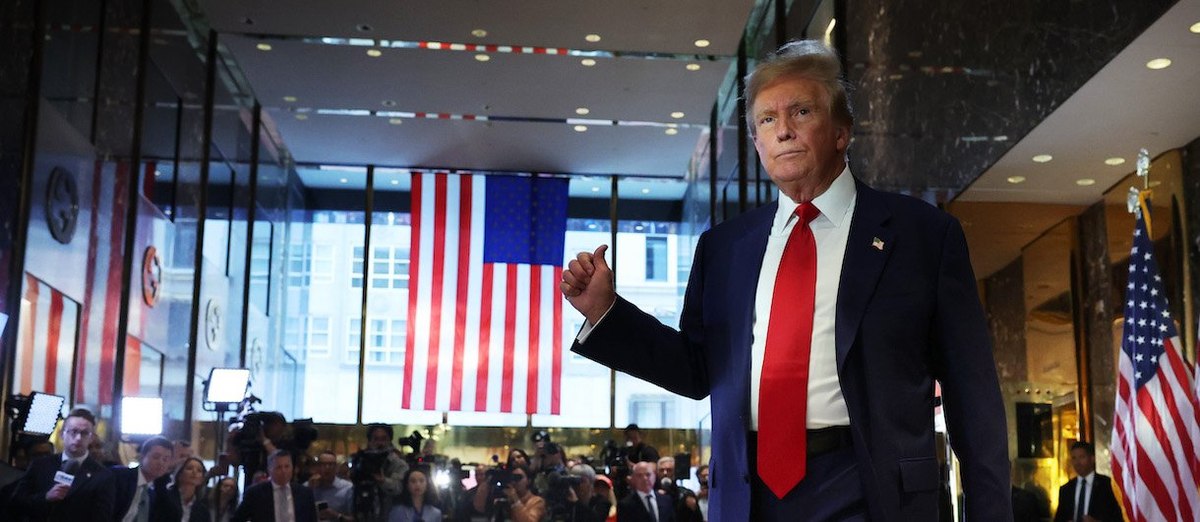This week’s Economist/YouGov poll covers the closely contested presidential and House elections, the economy, what outcome other countries want in the U.S. presidential election, and gun policy.
The latest on Harris vs. Trump
- It's a neck–and-neck race, with 45% of registered voters supporting Kamala Harris and 45% supporting Donald Trump in this poll, which concluded before Tuesday's Harris-Trump debate
- This is the first Economist / YouGov Poll in which Trump hasn't trailed Harris since July 21 - 23, conducted in the immediate aftermath of President Joe Biden's withdrawal from the race
- Registered voters are closely divided on which candidate they think will win: 39% say Harris, and 37% say Trump
- Last week 40% of registered voters picked Harris as the expected winner, compared to 34% for Trump
- There's also a tie over the race for Congress: 45% of registered voters say they would vote for the Democratic candidate for Congress, and 45% say they'd vote for the Republican candidate
- This is the first time Democratic candidates haven't led on this congressional poll since June
- These changes are within the poll's margin of error
Economy
- Americans remain generally pessimistic about the U.S. economy
- 70% say the U.S. economy is "fair" or "poor," while 27% say it's "good" or "excellent"
- 49% say the economy is getting worse; 19% say it's getting better
- 41% believe the U.S. economy is currently in a recession; another 19% believe a recession is very or somewhat likely in the next 12 months
- 45% say their personal family finances are worse off than a year ago; 14% say they're better off
Foreign policy
- Most Americans believe Russia (69%), China (66%), and Iran (52%) are trying to influence the U.S. presidential election
- Fewer U.S. adult citizens believe that Israel (38%) or Ukraine (31%) is trying to influence the election
- But there's less consensus over which candidates these foreign countries might be trying to bolster. In several cases, supporters of each candidate are convinced these foreign countries are trying to help the other side
- For example, 76% of Trump supporters say China supports Harris, while just 8% say China favors Trump. But Harris supporters are more likely to have the opposite view: 48% say China favors Trump, and 12% say it favors Harris
- Views on who Iran and Russia support are also polarized
- There's more consensus on Israel (50% of U.S. adult citizens say it favors Trump, while 16% say it favors Harris) and Ukraine (53% say it favors Harris, while 14% say it favors Trump)
Guns
- In the wake of a Sept. 4 shooting in Georgia's Apalachee High School, majorities of Americans support several ways of making U.S. gun laws more restrictive
- 54% of U.S. adult citizens say laws covering the sale of handguns should be made more strict, while 10% say they should be less strict. 28% want no change, and 8% aren't sure
- 79% strongly or somewhat support requiring criminal and background checks for all gun sales, including private sales; 13% strongly or somewhat oppose this
- 77% support holding parents legally responsible if their child commits a crime with a gun they got from their parents; 13% oppose
- 72% support "red flag laws" that allow courts to temporarily remove guns from people believed to pose a danger to themselves or others; 18% oppose
- 59% of Americans support banning assault rifles; 31% oppose
- More Americans say they strongly favor each of background checks, reg flag laws, banning assault rifles, and holding parents legally responsible for their children's gun crimes than say they strongly oppose each of those policies
- Democrats are more likely than Republicans to support most gun control measures
- But majorities of Republicans support background checks, red flag laws, and holding parents responsible for their children's gun crimes
- Another proposal offered up in response to school shootings, allowing teachers to carry concealed weapons at school, is divisive: 43% support it, and 45% oppose it
- Overall, Americans' views on gun control have been relatively stable for years, though the partisan divide has widened somewhat
Throughout this report, some numbers may appear to be off by 1 because of rounding
— Carl Bialik and Taylor Orth contributed to this article
See the toplines and crosstabs for the September 8 - 10, 2024 Economist/YouGov Poll
Methodology: The poll was conducted among 1,626 U.S. adult citizens. Respondents were selected from YouGov’s opt-in panel to be representative of U.S. adult citizens. A random sample (stratified by gender, age, race, education, geographic region, and voter registration) was selected from the 2019 American Community Survey. The sample was weighted according to gender, age, race, education, 2020 election turnout and presidential vote, baseline party identification, and current voter registration status. Demographic weighting targets come from the 2019 American Community Survey. Baseline party identification is the respondent’s most recent answer given prior to November 1, 2022, and is weighted to the estimated distribution at that time (33% Democratic, 31% Republican). The margin of error for the overall sample is approximately 3%.
Image: Getty (Spencer Platt)
What do you think about the election, American politics in general, and everything else? Have your say, join the YouGov panel, and get paid to share your thoughts. Sign up here.















